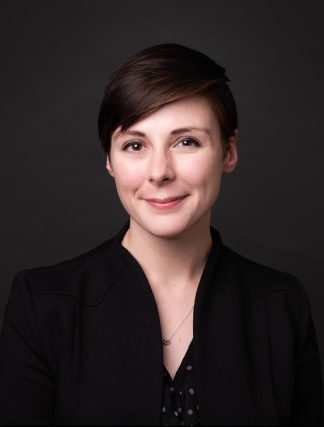Dr. Rebecca Monteleone is interested in epistemic injustice.
But that pull-out-the-dictionary term is perhaps not the best way to describe her work, which involves reaching out to people with intellectual and developmental disabilities and drawing them into conversation – in some cases conversation about intellectual and developmental disability.

Dr. Rebecca Monteleone, an assistant professor of disability studies, co-founded the Plain Truth Project with two journalists.
One way to do this is through plain language, a conscientiously simplified way of communicating that’s free of jargon, convoluted sentences and other obstacles to immediate comprehension.
A term like “epistemic” wouldn’t fly.
Monteleone, an assistant professor of disability studies at The University of Toledo, is a co-founder with two journalists of the Plain Truth Project, a collaboration among journalists, researchers and self-advocates with intellectual and developmental disabilities aimed at making the way news is delivered more inclusive. That mission encompasses a wide variety of questions: Do people with intellectual and developmental disabilities have access to news outlets? Is the news they can access presented in ways that are understandable to them? Does it reflect their perspectives, both in cases where the subject does and doesn’t touch specifically on disability?
Stakeholders discussed these questions at a first-ever workshop last month in Washington, D.C.
“What we do know about coverage of people with intellectual and developmental disabilities is that there isn’t a lot of firsthand sourcing. Journalists typically go to parents or professionals or someone else to get information,” Monteleone said. “So our plan had always been to get those two groups of people together, to just brainstorm and to come up with some best practices around how journalists should be engaging with people with intellectual and developmental disabilities.”
The Plain Truth Project traces its roots to an Arizona Daily Star-ProPublica collaboration in 2020, in which reporters led a deep dive into Arizona’s Division of Developmental Disabilities. Monteleone connected with the reporters through a public storytelling workshop she was hosting for people with intellectual and developmental disabilities there at the time, and later signed on to translate the resulting article into plain language.
Monteleone, Amy Silverman, who authored the original Arizona Daily Star-ProPublica investigation, and Beena Raghavendran, who was previously at ProPublica and is now at The New York Times, believe it was the first time a mainstream news outlet in the United States has ever presented an article this way, and they fielded a fair amount of interest from journalistic corners about it. But they wondered if it did indeed reach readers with intellectual and developmental disabilities.
The trio decided to continue that conversation with the Plain Truth Project.
There’s a research component to the project. Monteleone, Silverman and Raghavendran published an article about their plain language translation in the Canadian Journal of Disability Studies, and Monteleone said she expects further research publications to come out of the focus groups she’s hosted since on access and inclusion in journalism.
There’s also a collaborative component, as in last month’s gathering. Monteleone shared some of her research there. Organizers also opened the floor to journalists and to self-advocates, including Phillis Schmidbauer and Darius Cunningham, Toledoans with intellectual disabilities who are paid as consultants by the Plain Truth Project, to discuss how they can work with each other.
“We’re planning to create some public-facing documents on that topic that we’ll share first with people who participated with us, because they’re our collaborators now,” Monteleone said. “Then we want to refine those and make them available for public use, too.”
It’s ultimately a high-stakes issue, Monteleone explained.
“The academic framework is epistemic injustice,” she said. “It’s basically this argument that people with intellectual disabilities get excluded from discourses about themselves because they are people with intellectual disabilities. They are categorically excluded from producing knowledge about themselves.
“It creates a condition under which other people take over their decision-making processes because they just assume that they’re not able to make those decisions for themselves. That kind of control leads to things like institutionalization and to guardianship arrangements where a person can’t sign legal documents themselves, so they can’t buy their own house, they can’t get married, they can’t get a driver’s license, they can’t vote. All of these things have really serious consequences.”
Monteleone brings a uniquely tailored background to the study of epistemic injustice and disability: She has a degree in disability studies from Ohio State University, studied the sociology of intellectual disability as a master’s student and Fulbright Scholar at the University of Kent in the United Kingdom, and completed a doctorate in the human and social dimensions of science and technology at Arizona State University.
In 2020 she joined the disability studies faculty in the UToledo College of Arts and Letters, where her department colleagues have expertise in a wide variety of subjects, from gender studies to history to poetry. To her that reflects the interdisciplinarity of the liberal arts-based program that attracted her to UToledo.
“The ability to really come at disability from so many different perspectives that aren’t rooted in medicine, that aren’t rooted in curative or therapeutic ideas, but instead are rooted in disability as a historical, a cultural, a political object, it’s pretty unique,” she said.